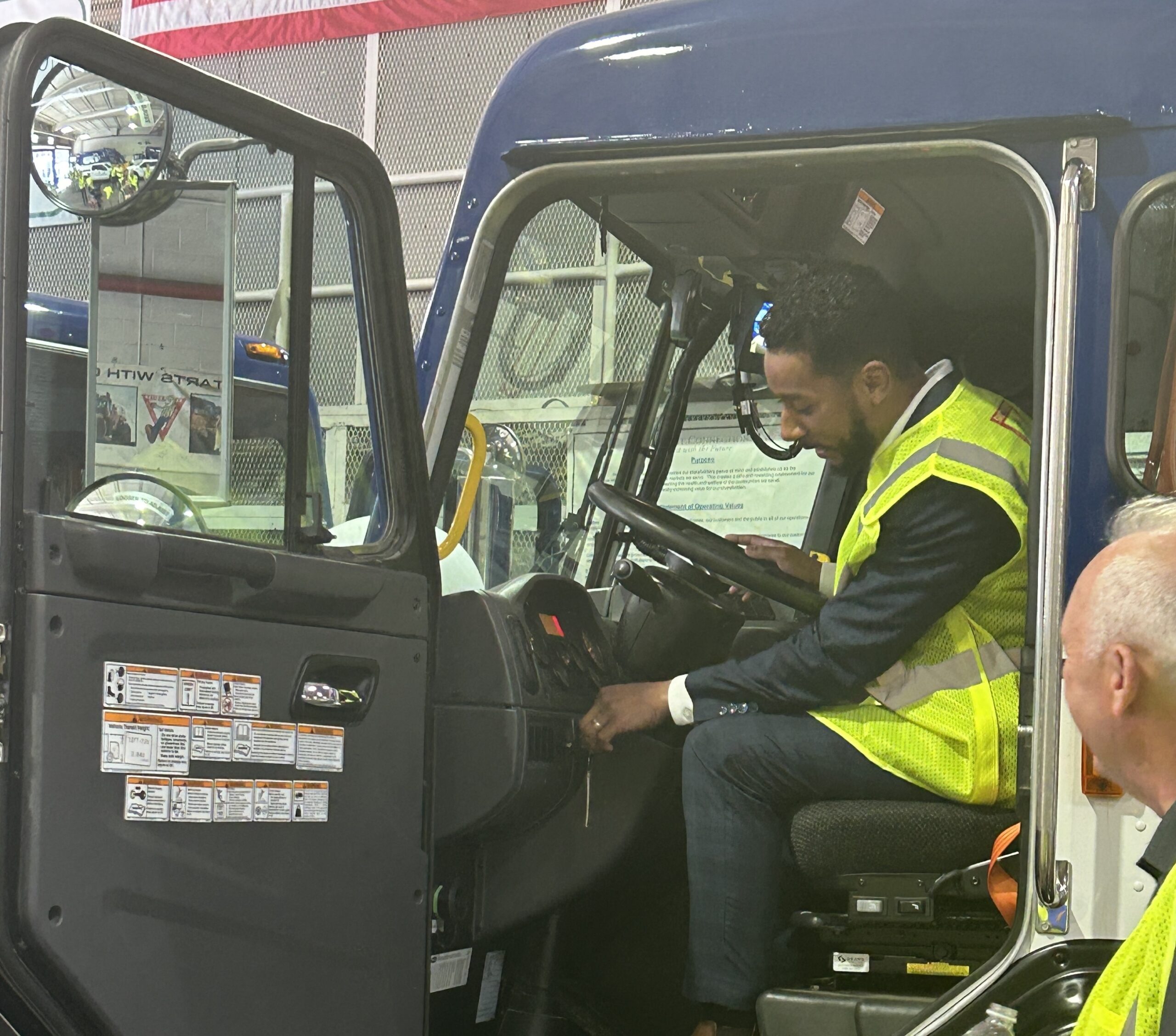A Port Morris-based private waste carting company will be one of the first to participate in the city’s newly reformed program to divide commercial waste pickup.
Waste Connections of NYC unveiled two new electric garbage trucks at its 2630 Park Avenue headquarters on June 27. The trucks will serve customers in central Queens, starting in September. The company will later serve parts of Brooklyn and Manhattan.
The new hauling routes are part of a new law that was passed in 2019, which aims to streamline private waste operations across the five boroughs by dramatically reducing the number of carters allowed to operate in each neighborhood.
The 20 commercial waste zones that the city has carved out, including two on the Bronx, will each have a maximum of three private carting companies serving them.
Brooklyn Borough president Antonio Reynoso, who sponsored Local Law 199 while serving as a member of the city council, attended the low-key event at Waste Connections’ headquarters, where he said the law will make the city safer by cutting down on truck traffic, to enhance safety for pedestrians, drivers, while helping take a bite out of air pollution.
“We’re going to be saving lives,” said Reynoso.
South Bronx City Council members Diana Ayala and Rafael Salamanca, Jr. supported the bill.
Although residential waste is handled by the city’s sanitation department, private carters have been handling commercial garbage since the 1950s. Currently more than 90 private carters operate in the city, with as many as 50 operating in a single neighborhood, according to a report by the Department of Sanitation.
The DSNY did not respond to requests for comment from the Herald.
Elected officials and advocates who sought to fix commercial carting criticized the city’s way of carrying it out. Truck routes, they argue, are inefficient, forcing drivers to drive several miles out of their way to pick up waste. To complete these long routes in a timely manner, drivers for private companies often take “risky, dangerous and often illegal” shortcuts that endanger the lives of themselves and others, including speeding, driving in the wrong direction and running stop lights, according to the report.
“Many of them should never have had any business doing work in this city,” Reynoso said.
The glut of private carters and inefficient truck routes has also led to higher traffic and emissions. In 2021, solid waste collection vehicles emitted around 68,000 tons of greenhouse gas emissions, according to the NYC Greenhouse Gas Inventories.
When they were applying to be selected on the city’s short list, carters were required to submit their plan for using zero emission vehicles, in alignment with Mayor Adams’ climate goals.
Waste Connections’ two new trucks are 100% electric, requiring 20 hours to charge. A single charge lasts around 125 miles, according to Moises Acevedo, operations manager at the company.
“The (former diesel) trucks left a lot of pollution in the air,” said Acevedo. “We wanted to show customers how much greener we have gotten through the years.”
Driver safety is a key component of the company’s philosophy, said Acevedo . According to the Bureau of Labor Statistics, trash and recycling collection is one of the top ten most dangerous jobs in the country.
“I don’t want my drivers driving around in a truck that’s smoking and having problems and breaking down,” Acevedo said. “Those are our frontline guys, and without them, we don’t operate.”
The sanitation department estimates that the new commercial waste sones will lead to approximately 12 million fewer miles traveled by private carter trucks each year.
More than 250 private carters operated in the Bronx between 2016 and 2017, with 27 operating across the South Bronx and 25 in Hunts Point, reflecting the amount of waste generated by the Hunts Point food distribution market, according to the 2018 report.
The Bronx will be split into two commercial waste zones. Bronx West will include Mott Haven, Highbridge, Belmont, Norwood and Kingsbridge, while Bronx East includes Longwood, Hunts Point, Throggs Neck, Woodlawn Heights and Eastchester.
The companies that will serve the Bronx are 5 Borough Waste Removal, Acting Carting Environmental Services, Royal Waste Services and Recycle Track Systems NYC.
Pedro Suavez, executive director of the Third Avenue Business Improvement District, said that although it is too early to predict its impact, the BID is open to working with the city and the private carting industry to ensure the commercial waste zoning runs smoothly.
“I think that the hope is that we reduce the amount of garbage that ends up on the street that rodents and other vermin are attracted to,” Suavez said. “It’s a work in progress. I think that Third Avenue could definitely benefit from being cleaner.”
Implementation dates for the 19 remaining commercial waste zones have not yet been announced.

